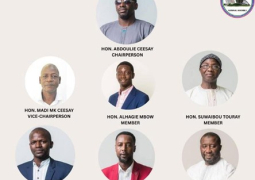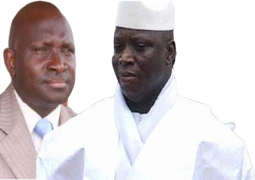
The NARI is among 7 countries collaborating with Independent Community Bankers of America (ICBA) with support from International Fund for Agricultural Development (IFAD) and The Arab Bank for Economic Development in Africa (BADEA) to implement the Improving Agricultural Resilience to Salinity through Development and Promotion of Pro-Poor Technologies (RESADE) Project.
The project aims to increase agricultural productivity and income in salinity affected agricultural areas by introducing salt tolerant crops varieties such as cereals, vegetables and livestock feed resources backed up with best agronomic practices.
Speaking during the 4th Steering Committee meeting of the RESADE Project at a local hotel in Bakau, he said: “Soil salinity is harming crop production for key crops. Increased salinity of the River Gambia is causing increasing salinity of the soil; thereby affecting crop production.”
According to The Gambia Poverty and Gender Assessment 2022 World Bank reports, households closer to the River Gambia are experiencing increasing salinity of their soil which in turn is negatively affecting the production of key crops such as rice, millet, groundnut, maize and sorghum.
However, the agricultural researcher said these stretches of saline affected fields are leading to a displacement of economic activities among many households as well as aggravating and widening their food and nutrition insecurity status.
“Combating the problem of saline soils requires a variety of tools; raising awareness to adopting sustainable soil amendment practices, promoting technological innovation, stronger political commitment and strengthening science-policy-society interface,” he said.
Moving forward, he said global cooperation is key to making appropriate and context-specific technologies and innovations available, accessible and affordable to the most vulnerable.
“We must not forget that science and innovation, including innovations arising from traditional and indigenous knowledge, can provide tangible results for people, planet and profit.
Demba Sabally, minister for Agriculture, said salinity has an adverse effect on agricultural production with dire consequences for rural livelihoods and sustainable development in general.
“Salinity causes decline in soil productivity and crop yields; increased use of input; reduces farmers’ income and food supply especially for subsistence farmers. And in severe cases results in abandonment of farmlands and complete cessation of production activities,” he said.
Minister Sabally said prevention and mitigation of salinity is important to advance agricultural development, particularly as agriculture transitions from traditional rain-fed systems to a more commercialised intensive irrigated agriculture.
He informed that the River Gambia as the main source of irrigation water, especially for rice production contains saline water in the lower half and fresh water in the other, especially in the Central and Upper River Regions.
He added: “Climate Change dynamics have resulted in upstream movement of the saline front. As we speak, the fresh water riverbanks which used to be the rice basket of this country continue to shrink. The saline front has now covered the entire Lower River Region and now almost the Central River Region south.”
“In the northern side, the saline front has now extended to the Soloums with fear that it will reach to the main rice growing areas of the CRR south.”
Dr. Luis Augusto Baccerra, chief scientist ICBA, described the meeting as significant in exchanging ideas, and said finance access is essential in the implementation of the project among vulnerable communities.
Dr. Viviane Filippi, IFAD representative, BADEA, believed that NARI has the needed capacity to address the menace but was quick to add that there is a need for better policies.





